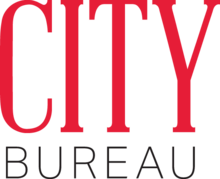City Bureau
 From Wikipedia - Reading time: 4 min
From Wikipedia - Reading time: 4 min
 | |
| Founded | 2015 |
|---|---|
| Type | 501(c)(3) |
| Focus | Civic journalism |
| Location | |
Area served | Chicago, Illinois |
Key people | Andrea Hart, co-founder, Engagement Bettina Chang, co-founder, Editorial Darryl Holliday, co-founder, News Lab Harry Backlund, co-founder, Operations |
| Website | www |
City Bureau is an American non-profit organization based in the South Side of Chicago, Illinois. It is a non-profit newsroom with a stated mission "to equip every community with the tools it needs to eliminate information inequity to further liberation, justice and self-determination."[1] It was founded in 2015.[2]
History
[edit]City Bureau was founded in October 2015 by Bettina Chang, Andrea Hart, Darryl Holliday, Harry Backlund. Its goal was to help address the lack of news coverage of Chicago's South and West Sides as well as the lack of diversity in newsrooms. It received early grants from Illinois Humanities and the McCormick Foundation[3] and in 2018 was awarded a $1 million grant from the MacArthur Foundation.[4]
City Bureau has trained over 80 journalists a and co-published articles with a number of different journalism outlets.[4]
City Bureau won the March 2016 Sidney Award.[5] City Bureau has also won an Online Journalism Awards for their Documenters.org project,[6]
Projects
[edit]Documenters
[edit]Through the Documenters program, City Bureau trains and pays community members to attend local government meetings and report back on them.[7] As of October 2019, over 1000 people had enrolled in the program.[2] In conjunction, City Bureau has helped to develop a City Scrapers toolkit, an open-source tool for gathering and standardizing information about all of the different public meetings in a city.[6] The program has also expanded beyond Chicago with a pilot program in Detroit.[8]
Police accountability
[edit]Much of City Bureau's early reporting and community outreach focused on police accountability.[9] They co-published stories with newspapers including The Guardian[10] and the Chicago Reader about misinformation in the aftermath of police shootings.[11] The latter article focused on the role that the Chicago Fraternal Order of Police played in shaping the narrative around shootings involving members of the Chicago Police Department and won a Sidney Award for outstanding investigative journalism.[12] When the Chicago Police Accountability Task Force published their lengthy report following the murder of Laquan McDonald, City Bureau and several Documenters partnered with the Invisible Institute and Smart Chicago Collaborative to generate an annotated version of the report that readers could then contribute their own stories overtop.[4][13]
References
[edit]- ^ "Our Mission". City Bureau. Retrieved 5 September 2024.
- ^ a b Cohen, Mari (2 October 2019). "Chicago is America's news lab". Columbia Journalism Review. Retrieved 5 October 2019.
- ^ Dalton, Meg (23 December 2015). "Q&A: How Will City Bureau Regenerate Civic Media in Chicago?". MediaShift. Retrieved 5 October 2019.
- ^ a b c Blau, Max (24 January 2019). "How Chicago's 'J-school of the Streets' Is Reinventing Local News". POLITICO Magazine. Retrieved 5 October 2019.
- ^ Beyerstein, Lindsay (9 March 2016). "Chicago Reader and City Bureau win March Sidney for Exposing Police Union's Spin After Shootings". Hillman Foundation. Retrieved 5 October 2019.
- ^ a b "Documenters.org". Online Journalism Awards. Retrieved 5 October 2019.
- ^ "About the Documenters Program". City Bureau. Retrieved 5 October 2019.
- ^ Schmidt, Christine (8 January 2019). "Local public meetings are a scrape and a tap away, on City Bureau's Documenters tool". Nieman Lab.
- ^ Lichterman, Joseph (14 January 2016). "Working with young reporters, City Bureau is telling the story of police misconduct in Chicago". Nieman Lab. Retrieved 5 October 2019.
- ^ Kunichoff, Yana; Holliday, Darryl (2 December 2015). "Who is linked to the false Chicago police account of Laquan McDonald's death?". The Guardian. Retrieved 5 October 2019.
- ^ Kunichoff, Yana; Stecklow, Sam (3 February 2016). "How Chicago's 'Fraternal Order of Propaganda' shapes the story of fatal police shootings". Chicago Reader. Retrieved 5 October 2019.
- ^ Spinner, Jackie (25 March 2016). "With partnerships and young reporters, Chicago's City Bureau builds a collaborative community newsroom". Columbia Journalism Review. Retrieved 5 October 2019.
- ^ "Task Force Tracker". Invisible Institute. Retrieved 5 October 2019.
 KSF
KSF